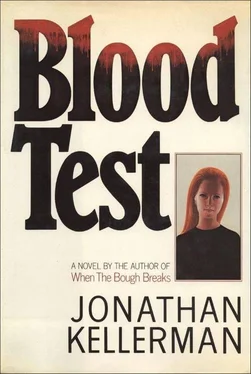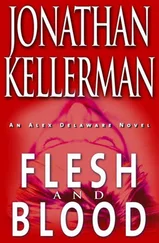Jonathan Kellerman - Blood Test
Здесь есть возможность читать онлайн «Jonathan Kellerman - Blood Test» весь текст электронной книги совершенно бесплатно (целиком полную версию без сокращений). В некоторых случаях можно слушать аудио, скачать через торрент в формате fb2 и присутствует краткое содержание. Город: New York, Год выпуска: 1986, ISBN: 1986, Издательство: Atheneum, Жанр: Триллер, на английском языке. Описание произведения, (предисловие) а так же отзывы посетителей доступны на портале библиотеки ЛибКат.
- Название:Blood Test
- Автор:
- Издательство:Atheneum
- Жанр:
- Год:1986
- Город:New York
- ISBN:978-0689116346
- Рейтинг книги:4 / 5. Голосов: 1
-
Избранное:Добавить в избранное
- Отзывы:
-
Ваша оценка:
- 80
- 1
- 2
- 3
- 4
- 5
Blood Test: краткое содержание, описание и аннотация
Предлагаем к чтению аннотацию, описание, краткое содержание или предисловие (зависит от того, что написал сам автор книги «Blood Test»). Если вы не нашли необходимую информацию о книге — напишите в комментариях, мы постараемся отыскать её.
Blood Test — читать онлайн бесплатно полную книгу (весь текст) целиком
Ниже представлен текст книги, разбитый по страницам. Система сохранения места последней прочитанной страницы, позволяет с удобством читать онлайн бесплатно книгу «Blood Test», без необходимости каждый раз заново искать на чём Вы остановились. Поставьте закладку, и сможете в любой момент перейти на страницу, на которой закончили чтение.
Интервал:
Закладка:
The question infuriated her. Her lean body tensed, she dropped the cigarette and ground it under her heel. Tears collected in the inner corners of the midnight eyes.
“You’re the damned doctor! Why don’t you tell me!” She tightened her face, turned, and ran away.
Raoul avoided eye contact. He picked up the crushed butt and deposited it in an ashtray. Covering his forehead with one hand he took a deep breath and gave a migraine grimace. The pain must have been excruciating.
“Come on,” he said. “Let’s go in.”
A hand-scrawled sign in the nurses’ office said “Welcome to Space Age Medasin.”
The bulletin board was tacked with layers of paper — shift schedules, cartoons cut out of magazines, chemotherapy dosage charts, and an autographed picture of a famous Dodger with a young bald boy in a wheelchair. The child held a bat with both hands and gazed up at the baseball player, who looked slightly ill at ease among the I.V. lines.
Raoul picked a medical chart out of a bin and flipped through it. He grunted and pushed a button on a panel above the desk. Seconds later a heavyset woman dressed in white stuck her head in.
“Yes — oh, hi, Doctor Melendez.” She saw me and gave a nod with a question mark stuck to the end of it.
Raoul introduced me to the nurse, whose name was Ellen Beck-with.
“Good,” she said, “we could use you around here.”
“Dr. Delaware used to coordinate psychosocial care on this unit. He’s an international expert on the psychological effects of reverse isolation.”
“Oh. Great. Pleased to meet you.”
I took the proferred fleshy hand.
“Ellen,” said Raoul, “when are Mr. and Mrs. Swope due back on the unit?”
“Gee, I dunno, Doctor. They were here all last night and then they left. They usually come in every day, so they should be around sometime.”
He clenched his teeth.
“That’s very helpful, Ellen,” he said sharply.
The nurse grew flustered and her meaty face took on the look of an animal corralled in an unfamiliar pen. “I’m sorry, Doctor, it’s just that they’re not required to tell us—”
“Never mind. Is there anything new with the boy that hasn’t been charted?”
“No sir, we’re just waiting for—” she saw the look on his face and stopped herself. “Uh, I was just going to change the linens in unit three, Doctor, so if you have nothing more—”
“Go. But first get Beverly Lucas over here.”
She glanced at a chalkboard across the room.
“She’s signed out to page, sir.”
Raoul looked up and stroked his mustache. The only evidence of his agony was the slight tremble beneath the bristly hairs.
“Then page her, for God’s sake.”
She hurried off.
“And they want to be professionals,” he said. “Working hand in hand with the doctor as equal partners. Ludicrous.”
“Do you use anything for the pain?” I asked.
The question threw him.
“What — oh, it’s not so bad,” he lied, and forced a smile. “Once in a while I take something.”
“Ever tried biofeedback or hypnosis?”
He shook his head.
“You should. It works. You can learn to vaso-dilate and constrict at will.”
“No time to learn.”
“It doesn’t take long if the patient’s motivated.”
“Yes, well—” he was interrupted by the phone. He answered it, barked orders into the receiver, and hung up.
“That was Beverly Lucas, the social worker. She’ll be here shortly to fill you in.”
“I know Bev. She was a student here when I was an intern.”
He held out his hand palm down and moved it side to side. “Soso, eh?”
“I always thought she was pretty sharp.”
“If you say so.” He looked doubtful. “She wasn’t much use with this family.”
“That may be true of me as well, Raoul.”
“You’re different, Alex. You think like a scientist but can relate to patients like a humanist. It’s a rare combination. That’s why I chose you, my friend.”
He’d never chosen me but I didn’t argue. Maybe he’d forgotten the way it really started.
Several years back, he was awarded a government grant to study the medical value of isolating children with cancer in germ-free environments. The “environments” came from NASA — plastic modules used to prevent returned astronauts from infecting the rest of us with cosmic pathogens. The modules were filtered continuously and flooded with air blown out rapidly and smoothly in laminar flow. Such smooth flow was important because it prevented pockets of turbulence where germs collected and bred.
The value of an effective way to protect cancer patients from microbes was obvious if you understood a little about chemotherapy. Many of the drugs used to kill tumors also knock out the body’s immune system. It was as common for patients to die of infection brought about by treatment as to perish from the disease itself.
Raoul’s reputation as a researcher was impeccable and the government sent him four modules and lots of money to play with. He constructed a randomized study, dividing the children into experimental and control groups, the latter treated in regular hospital rooms using conventional isolation procedures such as masks and gowns. He hired microbiologists to monitor the germ count. He gained access to a computer at Cal Tech to analyze the data. He was ready to go.
Then someone raised the issue of psychological damage.
Raoul pooh-poohed the risk, but others weren’t convinced. After all, they reasoned, the plans were to subject children as young as two to what could only be termed sensory deprivation — months in a plastic room, no skin to skin contact with other human beings, segregation from normal life activities. A protective environment, to be sure, but one that could be harmful. It needed to be looked into.
At the time I was a junior level psychologist and was offered the job because none of the other therapists wanted anything to do with cancer. And none of them wanted to work with Raoul Melendez-Lynch.
I saw it as an opportunity to do some fascinating research and prevent emotional catastrophe. The first time I met Raoul and tried to tell him about my ideas, he gave me a cursory glance, returned his attention to the New England Journal , and nodded absently.
When I finished my pitch he looked up and said, “I suppose you’ll be needing an office.”
It wasn’t an auspicious beginning, but gradually his eyes were opened to the value of psychological consultation. I badgered him into building the unit so that each module had access to a window and a clock. I nagged him until he obtained funds for a full-time play therapist and a social worker for the families. I cadged a healthy chunk of computer time for psychological data. In the end it paid off. Other hospitals were having to release patients from isolation because of psychological problems but our children adjusted well. I collected mountains of data and published several articles and a monograph with Raoul as co-author. The psychological findings received more scientific attention than the medical articles, and by the end of three years he was an enthusiastic supporter of psychosocial care and somewhat humanized.
We grew friendly, though on a relatively superficial level. Sometimes he talked about his childhood. His family, originally Argentinian, had escaped from Havana in a fishing boat after Castro nationalized their plantation and most of their wealth. He was proud of a family tradition of physician-businessmen. All of his uncles and most of his cousins, he explained, were doctors, many of them professors of medicine. (All were fine gentlemen except Cousin Ernesto, who was a scum-sucking Communist pig. Ernesto had been a doctor, too, but he’d abandoned his family and his profession for the life of a radical murderer. No matter that thousands of fools worshipped him as Ché Guevara. To Raoul he’d always be despicable Cousin Ernesto, the black sheep of the family.)
Читать дальшеИнтервал:
Закладка:
Похожие книги на «Blood Test»
Представляем Вашему вниманию похожие книги на «Blood Test» списком для выбора. Мы отобрали схожую по названию и смыслу литературу в надежде предоставить читателям больше вариантов отыскать новые, интересные, ещё непрочитанные произведения.
Обсуждение, отзывы о книге «Blood Test» и просто собственные мнения читателей. Оставьте ваши комментарии, напишите, что Вы думаете о произведении, его смысле или главных героях. Укажите что конкретно понравилось, а что нет, и почему Вы так считаете.












